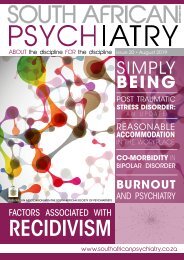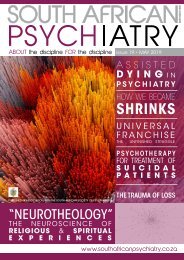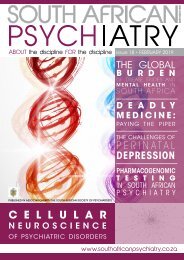South African Psychiatry - November 2018
South African Psychiatry - November 2018
South African Psychiatry - November 2018
Create successful ePaper yourself
Turn your PDF publications into a flip-book with our unique Google optimized e-Paper software.
SASOP<br />
SOUTH AFRICAN SOCIETY OF<br />
PSYCHIATRISTS<br />
undertaken in consultation with all the relevant<br />
stakeholders, be based on good quality scientific<br />
evidence and take into consideration the availability<br />
and accessibility of current drug addiction,<br />
prevention and treatment resources in <strong>South</strong> Africa.<br />
“SASOP concurs with the Executive Committee of<br />
the Central Drug Authority (CDA) of <strong>South</strong> Africa<br />
that the approaches to combat the use and abuse<br />
of psychoactive substances should include harm<br />
reduction (interventions aimed at reducing the<br />
harmful consequences associated with substance<br />
use), supply reduction and demand reduction/<br />
preventative strategies.”<br />
“WE AGREE WITH THE EXECUTIVE<br />
COMMITTEE OF THE CDA THAT<br />
THERE IS CURRENTLY INSUFFICIENT<br />
EVIDENCE TO PREDICT THE LONG-<br />
TERM CONSEQUENCES OF THE<br />
LEGALIZATION OF CANNABIS.”<br />
“The ease of accessing an intoxicating substance<br />
may have an underestimated impact on the<br />
initiation, frequency and amount of use, and the<br />
subsequent risk of developing a substance use<br />
disorder. Legalization should therefore not have<br />
been considered at this point.”<br />
“The decriminalisation of cannabis removes the<br />
criminal penalty related to the use of cannabis; it<br />
allows for a distinction between a drug dealer and<br />
an individual experimenting with or addicted to a<br />
drug. While SASOP supports the human rights of all<br />
individuals, we argue that a decision to protect those<br />
addicted to substances should not be viewed as a<br />
simple binary decision based on criminal penalties.”<br />
IN 2001 PORTUGAL AUGMENTED<br />
THE DECRIMINALIZATION OF ILLICIT<br />
SUBSTANCES WITH DRUG DISSUASION<br />
COMMISSIONS, INCREASED THE<br />
NUMBER OF FACILITIES OFFERING<br />
DETOXIFICATION AND THERAPEUTIC<br />
ADMISSIONS, INCREASED THE NUMBER<br />
OF DRUG EDUCATION CAMPAIGNS AND<br />
REFOCUSED POLICING EFFORTS ON<br />
LARGE SCALE TRAFFICKING OPERATIONS.<br />
“The decriminalization of cannabis must be<br />
preceded by and augmented with similar socially<br />
responsible strategies for it to be successful in <strong>South</strong><br />
Africa.”<br />
DR DOMINGO SAYS AVAILABLE<br />
EVIDENCE DOES NOT SUPPORT THE<br />
STRONG POSITIVE PUBLIC OPINION<br />
AND ANECDOTAL REPORTS FAVOURING<br />
MEDICINAL CANNABIS.<br />
“The exceptions are the moderate quality evidence<br />
of medicinal cannabis for treating chronic pain,<br />
spasticity due to Multiple Sclerosis and weight loss<br />
associated with HIV. This evidence includes trials<br />
investigating pharmaceutical medications based<br />
on phyto-cannibinoids. Good quality evidence does<br />
however exist regarding the frequently occurring<br />
side effects of cannabis such as confusion, dizziness,<br />
diarrhea, euphoria, fatigue and hallucinations.”<br />
“Any potential benefit obtained from cannabis must<br />
therefore be weighed against its risk of causing<br />
addiction, psychosis, cognitive impairments and<br />
a 2.6 times greater likelihood of motor vehicle<br />
accidents. SASOP further notes with concern the<br />
growing evidence linking cannabis use with an<br />
increased risk of an acute myocardial infarction as<br />
well as an ischaemic stroke.”<br />
HE CONCLUDES TO SAY THAT “SASOP<br />
COMMENDS THE MEDICAL CONTROL<br />
COUNCIL’S DECISION TO LIMIT THE<br />
USE OF CANNABIS FOR MEDICINAL<br />
PURPOSES TO REGISTERED PRESCRIBERS<br />
AND FOR INDIVIDUALS IN WHICH<br />
AN ACCEPTABLE JUSTIFICATION IS<br />
PROVIDED.<br />
“We support ongoing research on the use of<br />
cannabis for medicinal purposes to ensure that its<br />
purported and potential benefits can be scientifically<br />
measured against medical and societal risks.”<br />
REFERENCE<br />
Research on 1 in 6 teenagers can be found here:<br />
https://www.ncbi.nlm.nih.gov/pmc/articles/<br />
PMC4827335/#!po=0.724638<br />
SOUTH AFRICAN PSYCHIATRY ISSUE 17 <strong>2018</strong> * 81

















